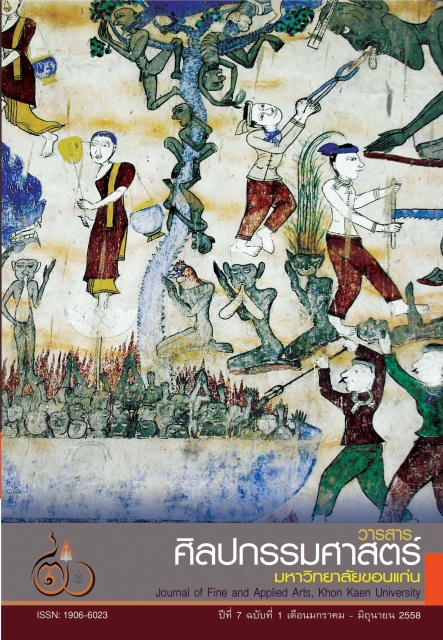การพัฒนายุทธศาสตร์การจัดการการเรียนรู้โดยการผสานทฤษฎี การเรียนรู้กลุ่มพฤติกรรมนิยมและกลุ่มปัญญานิยมต่อผลการเรียนวิชาดนตรีไทย ของนักเรียนระดับชั้นมัธยมศึกษาตอนต้น THE DEVELOPMENT OF LEARNING MANAGEMENT STRATEGIES BY COMBINING BEHAVIORAL LEARNING THEOR
Main Article Content
Abstract
การวิจัยครั้งนี้มีวัตถุประสงค์เพื่อ พัฒนายุทธศาสตร์การจัดการการเรียนรู้โดยการผสานทฤษฎีการเรียนรู้ ศึกษาผลการใช้ยุทธศาสตร์การจัดการการเรียนรู้โดยการผสานทฤษฎีการต่อผลการเรียนวิชาดนตรีไทยของนักเรียนระดับมัธยมศึกษาตอนต้นโดยพิจารณาจาก ผลการศึกษาเปรียบเทียบผลสัมฤทธิ์ทางการเรียนวิชาดนตรีไทยของนักเรียนก่อนและหลังการเรียนโดยใช้ยุทธศาสตร์ที่สร้างขึ้น ผลการศึกษาเปรียบเทียบทักษะดนตรีไทยของนักเรียนก่อนและหลังเรียนโดยใช้ยุทธศาสตร์ และผลการศึกษาเปรียบเทียบเจตคติที่มีต่อการเรียนดนตรีไทยของนักเรียนที่ได้เรียนก่อนและหลังเรียน
ระยะที่ 1 การศึกษาสภาพการจัดการเรียนรู้วิชาดนตรีไทย ประชากรและกลุ่มตัวอย่างที่ใช้ในศึกษาที่ใช้ในการศึกษามี 3 กลุ่ม ได้แก่ ครูภูมิ-ปัญญาดนตรีไทย ครูที่สอนดนตรีไทยระดับมัธยมศึกษาตอนต้นในเขตพื้นที่การศึกษามัธยมศึกษา
เขต 41 ปีการศึกษา 2555 และ อาจารย์สอนดนตรีไทยในระดับอุดมศึกษา โดยใช้แบบสัมภาษณ์แบบมีโครงสร้าง พบว่าสภาพปัจจุบันการจัดการเรียนการสอนไม่ปรากฏขั้นตอนที่ชัดเจนแล้วครูผู้สอน การจัดการการเรียนรู้ควรมีขั้นตอนที่ชัดเจนมีการแบ่งกลุ่มนักเรียนเพื่อให้เหมาะกับธรรมชาติของวิชา ควรใช้สื่อการสอนที่เป็นแบบฝึกทักษะและควรมีการจัดสภาพแวดล้อมในการจัดกิจกรรมการเรียนรู้วิชาดนตรีไทย
ระยะที่ 2 การพัฒนายุทธศาสตร์การจัดการเรียนรู้ การพัฒนายุทธศาสตร์การจัดการการเรียนรู้โดยการผสานทฤษฎีการเรียนรู้กลุ่มพฤติกรรมนิยมและทฤษฎีการเรียนรู้กลุ่มปัญญานิยมต่อผลการเรียนวิชาดนตรีไทยของนักเรียนระดับมัธยมศึกษาตอนต้นได้กำหนดกระบวนการพัฒนายุทธศาสตร์การจัดการการเรียนรู้ออกเป็น
3 ขั้นตอนคือ 1) วิเคราะห์การศึกษาสภาพการจัดการเรียนรู้วิชาดนตรีไทย 2) สังเคราะห์ยุทธศาสตร์และ 3) ตรวจสอบยุทธศาสตร์โดยผู้ทรงคุณวุฒิ โดยใช้แบบประเมินและแบบตรวจสอบพิจารณาค่าความสอดคล้องของเครื่องมือ พบว่าได้ยุทธศาสตร์หลัก คือ กระบวนการจัดการการเรียนรู้ซึ่งสังเคราะห์ได้ 5 ขั้นตอนได้แก่ ขั้นที่ 1 กลไกแห่งการรับรู้ ขั้นที่ 2 ดูการสาธิต ขั้นที่ 3 ฝึกปฏิบัติ ขั้นที่ 4 ทบทวนผลงาน และขั้นที่ 5 สรุปผลงาน และยุทธศาสตร์รอง คือ แนวทางสนับสนุนกระบวนการจัดการการเรียนรู้ประกอบด้วย 1) การจัดกลุ่มสอนแบบเพื่อนช่วยเพื่อน 2)การใช้แบบฝึกทักษะดนตรีไทย และ3) การจัดสภาพแวดล้อม
ระยะที่ 3 การศึกษาผลการใช้ยุทธศาสตร์การจัดการการเรียนรู้ กลุ่มตัวอย่าง คือ นักเรียนชั้นมัธยมศึกษาชั้นปีที่ 1 โรงเรียนหัวดงรัฐชนูปถัมภ์ สำนักงานเขตพื้นที่การศึกษามัธยมศึกษาเขต 41 ได้มาจากการเลือกแบบการสุ่มจำนวน 40 คน เครื่องมือที่ใช้ 1)แผนการจัดการการเรียนรู้ 2) แบบฝึกทักษะวิชาดนตรีไทย 3)แบบทดสอบวัดผลสัมฤทธิ์ทางการเรียนแบบปรนัยจำนวน 40 ข้อ 4) แบบวัดทักษะดนตรีไทย และ5) แบบสอบถามเจตคติที่มีต่อการเรียนดนตรีไทยซึ่งเป็นแบบสอบถามด้วยคำถามแบบมาตราส่วนประมาณค่า(Rating Scale) พบว่า 1) นักเรียนมีผลสัมฤทธิ์ทางการเรียนวิชาดนตรีไทยหลังเรียนสูงกว่าก่อนเรียนไม่น้อยกว่าร้อยละ 80 2) นักเรียนมีทักษะดนตรีไทยหลังเรียนสูงกว่าก่อนเรียนไม่น้อยกว่าร้อยละ 80 3) นักเรียนมีเจตคติต่อการเรียนดนตรีไทยหลังเรียนสูงกว่าก่อนเรียน
The purposes of this study were: to developed learning management strategies by combining behavioral learning theory and cognitive theory in order to enhance Thai music learning achievement of secondary school students, and to investigate the results after using the developed learning management strategies us considered by the following aspects; to study and compare Thai music learning achievement of the students before and after using the strategies, to study and compare the students’ Thai music skills before and after using the strategies, and to compare attitudes the students towards Thai music learning before and after using. The developed findings were as follows:
Phase I: Studying the conditions of Thai music learning management The population used in the study were divided into 3 groups: 1) Thai music wisdom teachers, 2) Thai music teachers in secondary schools in The Office of Secondary Educational Service Area Office 41 in academic year 2012. and 3) Thai music teachers in university level. As the results, nowadays the clear instruction steps were un clear therefore they showed be determine with the device groups of learners to appropriate for the subject nature including instructional media , skill practice exercise and musical environment management for learning activities. The research instrument were interview forms.
Phase II : Developing the learning management strategies There were three steps: 1) to analyze conditions of Thai music learning management, 2) to synthesize the strategies, and 3) to examine the strategies verification by the experts. The research instruments were evaluation forms and item objective congruence forms. The key strategies development were divided into 3 steps: 1) Thai music learning condition analysis, 2) The strategies synthesis, and 3) verification step by the experts. As the results, the 5 principle strategies steps were formed which step 1: perception process, step 2: demonstration watching, step 3: practice, step 4: revision and step5: conclusion. The subordinate strategies for supporting activities were ; 1) peer tutoring group , 2) skill practice usage, and 3) environment management. Phase III : Studying the results after using the learning management strategies The samples, randomly selected, were 40 grade 7 students of Huadongratchanupatam School in The Office of Secondary Educational Service Area Office 41. The research instruments consisted of learning management plans, Thai music exercises, achievement tests, Thai music skill evaluation forms, and attitude questionnaires towards Thai music learning.
The results were as follows: 1)The comparison of Thai music learning achievement of the students showed that their achievement after using the strategies was higher than the one before and not less than 80% percent. 2) The comparison of the students’ Thai music skills revealed that in skills after
using the strategies were higher than the one before and not less than 80% percent. 3) The comparison of the students’ attitudes towards Thai music learning showed that their opinions after using the strategies were higher than the one before in terms of feeling and behavior with high level.
Article Details
Content and information in articles published in the Journal of Fine and Applied Arts of Khon Kaen University is regarded as the opinion and sole responsibility of the author(s) directly; therefore, editors are not obliged to agree to or share any responsibility with regard to the content and information that appears within these articles.
All articles, information, content, image, etc. that have been published in the Journal of Fine and Applied Arts of Khon Kaen University is the copyright of the Journal of Fine and Appllied Arts of Khon Kaen University. Any person or organization who wishes to distribute all or parts of the articles for further dissemination or other usage must first receive permission from the Journal of Fine and Applied Arts of Khon Kaen University before proceeding to do so.


